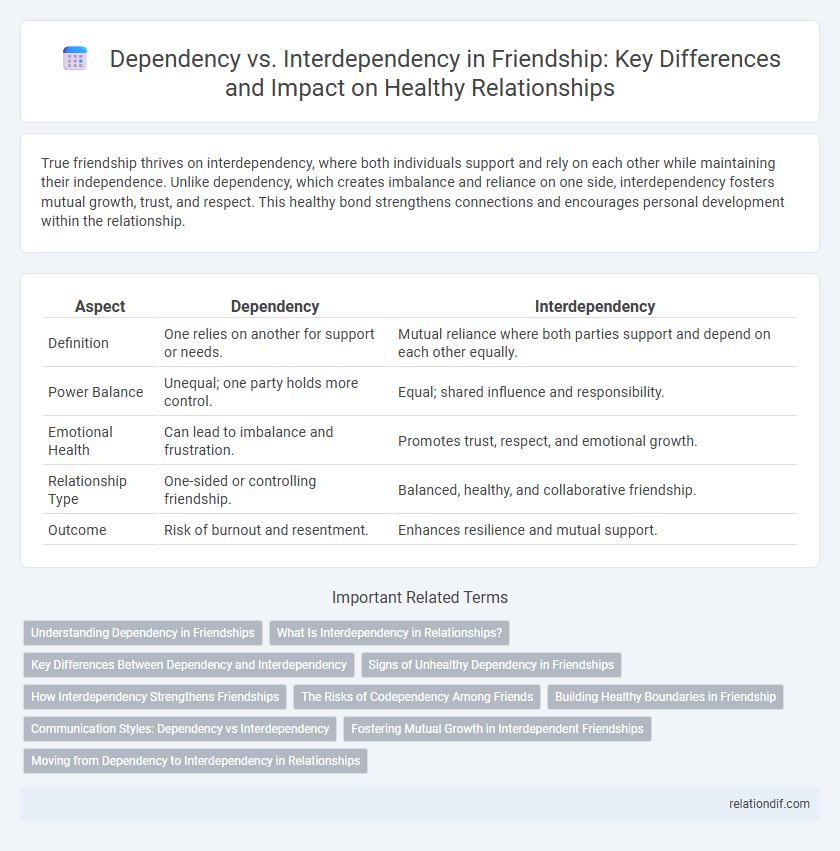True friendship thrives on interdependency, where both individuals support and rely on each other while maintaining their independence. Unlike dependency, which creates imbalance and reliance on one side, interdependency fosters mutual growth, trust, and respect. This healthy bond strengthens connections and encourages personal development within the relationship.
Table of Comparison
| Aspect | Dependency | Interdependency |
|---|---|---|
| Definition | One relies on another for support or needs. | Mutual reliance where both parties support and depend on each other equally. |
| Power Balance | Unequal; one party holds more control. | Equal; shared influence and responsibility. |
| Emotional Health | Can lead to imbalance and frustration. | Promotes trust, respect, and emotional growth. |
| Relationship Type | One-sided or controlling friendship. | Balanced, healthy, and collaborative friendship. |
| Outcome | Risk of burnout and resentment. | Enhances resilience and mutual support. |
Understanding Dependency in Friendships
Dependency in friendships involves relying heavily on another person for emotional support, validation, and decision-making, which can lead to imbalance and potential strain. Understanding dependency requires recognizing how excessive reliance may hinder personal growth and autonomy within the relationship. Developing interdependency fosters mutual support where both friends maintain individual strengths while contributing to a balanced and healthy connection.
What Is Interdependency in Relationships?
Interdependency in relationships refers to a balanced dynamic where both individuals rely on each other for support, growth, and well-being without losing their sense of autonomy. Unlike dependency, which involves one-sided reliance, interdependency fosters mutual trust, cooperation, and shared responsibility. This healthy connection enhances emotional resilience and strengthens bonds by encouraging personal development alongside collective harmony.
Key Differences Between Dependency and Interdependency
Dependency in friendship involves relying heavily on another person for emotional support or decision-making, often leading to an imbalance where one party may feel burdened or overwhelmed. Interdependency, by contrast, features mutual reliance where both friends contribute equally to each other's well-being, fostering a balanced and healthy relationship. Key differences include autonomy, where dependency can limit personal growth, while interdependency encourages independence alongside collaboration.
Signs of Unhealthy Dependency in Friendships
Signs of unhealthy dependency in friendships include constant need for approval, lack of personal boundaries, and one-sided emotional support that drains one party. Friends exhibiting jealousy when the other socializes outside the relationship or feels anxious when apart may indicate codependency rather than healthy interdependence. Persistent feeling of obligation or pressure to always prioritize the other friend's needs signals imbalance and the need for establishing mutual respect.
How Interdependency Strengthens Friendships
Interdependency in friendships fosters mutual support and trust, allowing individuals to rely on each other without losing their independence. This balanced connection encourages open communication and shared responsibility, which deepens emotional bonds and resilience. Friends engaged in interdependency experience increased satisfaction and lasting commitment, strengthening the overall quality of their relationship.
The Risks of Codependency Among Friends
Codependency among friends can lead to an unhealthy reliance where personal boundaries blur and individual growth is stifled, increasing emotional strain and imbalance. Friends caught in codependent dynamics often prioritize each other's needs over their own, which can result in resentment and loss of self-identity. Recognizing and fostering interdependency supports mutual support while maintaining autonomy, promoting balanced and resilient friendships.
Building Healthy Boundaries in Friendship
Building healthy boundaries in friendship fosters interdependency, where both individuals support each other's growth without losing autonomy. Avoiding dependency ensures that emotional needs are met through mutual respect rather than excessive reliance. Establishing clear limits promotes balanced connections, enhancing trust and long-term friendship stability.
Communication Styles: Dependency vs Interdependency
Dependency in friendship often relies on one-sided communication where one party seeks constant support without mutual exchange, limiting growth and balance. Interdependency fosters open, reciprocal communication styles where both friends actively listen, share feelings, and contribute equally to problem-solving and emotional support. Effective interdependent communication enhances trust, understanding, and resilience in friendships, creating a balanced and sustainable relationship dynamic.
Fostering Mutual Growth in Interdependent Friendships
Interdependent friendships cultivate mutual growth by encouraging both individuals to support and learn from each other's strengths and weaknesses. This dynamic balance fosters resilience and emotional well-being, allowing friendships to evolve with shared experiences and open communication. Unlike dependency, which can create imbalance, interdependency thrives on reciprocity and personal empowerment.
Moving from Dependency to Interdependency in Relationships
Moving from dependency to interdependency in friendships promotes mutual growth and balanced support, where both parties contribute and rely on each other equally. This shift fosters resilience by creating a partnership based on trust, respect, and shared responsibility rather than one-sided reliance. Developing interdependent relationships enhances emotional well-being and strengthens social connections, encouraging long-term stability and deeper understanding.
dependency vs interdependency Infographic

 relationdif.com
relationdif.com